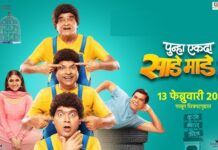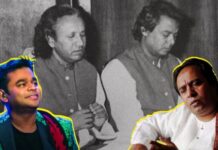Viacom18 Motion Pictures and Sanjay Leela Bhansali Productions Pvt. Ltd.’s Padmaavat (UA) is a historical that projects the glory, bravery and valour of Rajputs and their women.
King Maharawal Ratan Singh (Shahid Kapoor) falls in love with Padmavati (Deepika Padukone) the moment he sees her in a jungle, hunting an animal. Besotted by her following his interaction with her while she tends to him after her arrow mistakenly injures him, he expresses his desire to marry her. Her father gives his consent and the marriage is solemnised. Padmavati goes to her matrimonial home where the king already has a wife, Naagmati (Anupriya Goenka).
In Delhi, Jalaluddin Khilji (Raza Murad) has displaced the ruler and taken charge. He marries off his daughter, Mehrunisa (Aditi Rao Hydari), to his nephew, the debauch Alaudiin Khilji (Ranveer Singh). In this way, Jalaluddin Khilji is now both, the uncle and the father-in-law, of Alauddin Khilji.
In Ratan Singh’s kingdom, Rajguru (Aayam Mehta) is considered to be the extremely learned and wise man who guides the king. King Ratan Singh respects Rajguru a great deal. But one day, Rajguru is banished by the king from his kingdom for having broken protocol and ventured into the extremely private space of the king and his new bride, Padmavati.
Unable to forget the insult and humiliation, Rajguru tries to instigate Alauddin Khilji against king Ratan Singh but he does so very cunningly. Knowing that Alauddin Khilji is a womaniser, he tells him about the boundless beauty of Padmavati which makes Alauddin salivate for her. Dying to see Padmavati, Alauddin sends an invitation to king Ratan Singh to visit him with his family. By now, Alauddin has already murdered his uncle and usurped the seat of power for himself. Anyway, king Ratan Singh turns down the invitation of Alauddin because Alauddin Khilji’s reputation of being an evil person is well-known. Khilji takes this as an insult and decides to wage a war against king Ratan’s kingdom. He reaches the outskirts of the king’s kingdom with his army, waiting for the opportune time to strike. King Ratan Singh also readies his army to strike back as soon as Khilji would attack. After months of waiting, the evil Khilji cooks up a plan to reach Padmavati. He pretends to send his army back home so as to misguide king Ratan Singh. He also extends a hand of friendship to king Ratan Singh and seeks his permission to visit him. Ratan Singh receives Khilji in his kingdom and after having dinner together, Khilji asks to be introduced to Padmavati. At first unwilling, king Ratan soon relents. Padmavati is brought in front of Khilji but for a few seconds only. Alauddin goes crazy about Padmavati’s beauty but is livid because king Ratan had purposely allowed him to see Padmavati for some seconds only. Alauddin Khilji returns to his kingdom and cooks up another evil plan to get Padmavati to come to him.
As per plan, he first extends an invitation to king Ratan Singh but once the latter reaches Delhi, he holds him captive and sends a message to Padmavati to come to him if she wanted to save her husband. Back home, king Ratan Singh’’s first wife, Naagmati, jealous of Padmavati, accuses her for their husband’s captivity and tells her to ensure his freedom. Convinced that she must rescue her husband, Padmavati agrees to go to Khilji but if and only if he would agree to her conditions, one of which is that she would meet him in Delhi in his palace only after he had freed her husband. By her shrewdness and due to the assistance of Mehrunisa, Padmavati manages to run away with husband Ratan Singh without so much as even meeting Khilji. The frustrated Alauddin Khilji now declares war against king Ratan Singh’s kingdom because he is consumed by the desire to possess Padmavati. Before the war breaks out, Padmavati seeks her husband’s permission to commit jauhar – that is, to jump into the fire rather than be dishonoured by Khilji who was bound to capture her if king Ratan would lose the war.
As luck would have it, Khilji manages to kill king Ratan Singh, of course, by deceit. Not only does Padmavati commit jauhar herself but also motivates all the other women whose husbands were being killed on the battlefield by Alauddin Khilji’s men, to likewise commit jauhar. This is considered one of Khilji’s biggest defeat in history because although he won the war, he did not achieve the purpose for which he had waged the war.
The story is based on a chapter of history and brings out a heart-rending story of how Rajput women laid down their lives rather than be sexually exploited by men. It talks of Rajput pride, honour and valour in all its glory. However, the story-line is quite thin because it is about an evil man’s immense desire to possess someone else’s wife. The screenplay, penned by Prakash R. Kapadia and Sanjay Leela Bhansali, is very engrossing, engaging and interesting too. The screenplay is well-written and keeps the audience interest alive from the start till the end. Besides the thin story-line, another minus point, if one may use the term, is that it does not make the audience cry despite being a human drama. But these two ‘drawbacks’ are more than offset by the positives which include an arresting screenplay, grand sets, outstanding costumes, fantastic performances, superb dances and some exciting and hair-raising sequences. The climax leaves the audience feeling euphoric. Dialogues, penned by Prakash R. Kapadia, are excellent and some of them are even clapworthy.
Shahid Kapoor does a very fine job as king Ratan Rawal Singh. He looks handsome and acts ably. But Deepika Padukone and Ranveer Singh actually carry the film on their shoulders. Deepika Padukone looks like an ethereal beauty and her costumes and jewellery are to die for. The costumes and jewellery will be discussed by womenfolk and could be a reason for repeat audience. Her acting is so restrained that it is a delight to watch her performance. She lends the character of Padmavati the dignity it deserves. Ranveer Singh plays to the gallery and is so outstanding that this could rate as one of his best performances to-date. He often acts so hideously that the viewers would be constrained to think of him as being an animal rather than a human being. Ranveer Singh’s memorable performance could also bring in repeat audiences. In a special appearance, Raza Murad makes his presence felt with a noteworthy performance as Jalaluddin Khilji. Aditi Rao Hydari looks petite and pretty and delivers a fine performance as Mehrunisa. Anupriya Goenka stands her own as Ratan Singh’s first wife, Naagmati. Jim Sarbh leaves a mark with a fine performance as Mallik Kafur. Aayam Mehta is earnest and natural in the role of Rajguru. Ujjwal Chopra (as Gora Singh), Veena Mehta (as Suraj Baisa), Ashwin Dhar (as Ulugh Khan), Vibhav Roy (as Itaat Khan), Muzamil Bhawani (as Amir Khusro), Deepak Shreemali (as Badal Singh), Manish Wadhwa (as Gandharvasen), Hriday Malhotra (as Sujan Singh), Sharhaan Singh (as Vijaydaan Singh), Lankesh Bhardwaj (as Tribhuvan Pal), Komal Chhabria (as Jalaluddin’s wife), Qutee Nagpal (as Shanze), Gulshan Walia (as the head monk), Saar Kashyap (as Wardhan), Daljeet Sean Singh (as Shareef Pasha), Nazir Hussain (as Mongol chief), Priyanka Sunny Pawar (as Chittai), Rohit Choudhary (as Ikhtiyaar), Mohammad Sakir (as Mohammad), Mursaleen Qureshi (as Mursaleen), Farhan Siddiqui (as Ashfaq), Ayaz Khan (as the hakeem), Anuj Khurana (as Bijuriya), Sanjeev Sharma (as Hajuriya), Arvinder Shagmer Gill (as Tejveer) and the rest of the artistes lend decent support.
Sanjay Leela Bhansali’s direction is extraordinary. He has made the film a visual delight with his painstaking detailing, whether in the costumes of the actors or the sets. Despite a thin story-line, he has made the film so interesting that one can’t help but heap praises on him for a job extraordinarily done. His music score is very good. The ‘Ghoomar’ song is already a rage; ‘Ek dil ek jaan’ and ‘Khali bali’ are also very well-tuned numbers. Other songs have lilt. A.M. Turaz’s lyrics (one song is written by Siddharth-Garima) go very well with the mood of the film. The picturisation of the ‘Ghoomar’ song (by Kruti Mahesh Midya, with expert inputs by Jyoti Tommar) is so mindblowing that it becomes one of the high points of the film. Even the picturisation of the ‘Khali bali’ song (by Ganesh Acharya) is delighful. The other choreographer is Shampa Gopikishan. Sanchit Balhara’s background music is astounding. Sudeep Chatterjee’s cinematography is par excellence. Sham Kaushal’s action scenes are brilliantly taken. Production designing (by Subrata Chakraborty and Amit Ray) is truly terrific. The sets are grand. Rajesh G. Pandey’s editing is sharp.
On the whole, Padmaavat is a surefire hit and has all the trappings of a blockbuster. If the film is allowed to be screened peacefully all over India, it has the potential to smash box-office records. But opposition by Rajputs and failure of government machinery in various parts of the country, prompting many exhibitors to refrain from screening the film for fear of damage to the cinemas, will definitely take its toll on the film’s business unless corrective action is taken soon. The 3D conversion (by Prime Focus) is very well done and that will be an added attraction for the audience as the grand sets look grander in 3D.




























